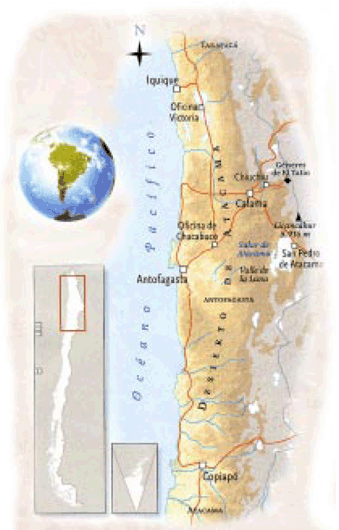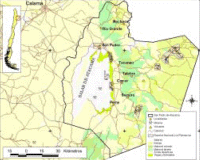Chile
Human Well-Being and Sustainable Management in San Pedro de Atacama-Chile
Project Summary

The sub-global assessment in Chile was coordinated by RIDES and took place
in the municipality of San Pedro de Atacama (SPA), which lies within the
world’s driest desert, the Atacama. The municipality encompasses a total
area of 23,439 km2, divided into two main geographical units. The western
zone consists of the Salar de Atacama Basin, which contains a watercourse
system that supports numerous bird species, including three species of emblematic
flamingos. The eastern zone consists of precordillera (Andean foothills),
cordillera (the Andes), and the sub-desertic steppe of the Puna de Atacama.
The high degree of social complexity (multiple users of ecosystems services)
in an adverse physical environment is the main characteristic of this sub-global
assessment. Indigenous people, large mining projects, tourism, and part-time
residency are primary features of life in the region. Additional relevant
groups include radioastronomy projects (ALMA and other similar projects),
regional universities, and government authorities. Because of the diversity
of ecosystem users, the SPA ecosystem assessment was conducted with a strong
participatory component, which aimed for the inclusion of the multiple stakeholders
of the region. Therefore, a multi-stakeholder Advisory Committee was formed
early in the process to accompany RIDES in the project development.
This project addressed several questions of ecological significance to
the region and produced alternative scenarios based on research into these
issues. Results indicate that the closed water basin system of the world’s
driest desert is highly vulnerable to any water extraction. Water rights
are divided amongst the various ecosystems users, but water extraction rights
have been granted on average for a higher level than the recharge rate coming
into the system. Particularly, extraction rates are higher than calculated
recharge rates in the southeast of the basin. Expansion of tourism and mining
are contentious issues in the community, and shared vision as to the direction
of these development activities was lacking.
Assessment Approach
The assessment was carried out in two stages over a period of 16 months,
from May 2003 until the end of 2004. Stage one, the base line, consisted
of collating and categorising all available information on each of the ecosystems
services identified by the users. Emphasis was placed on identifying the
conditions and trends and factors of change for each of the issues researched.
In-depth analysis of water resources, the creation and development of
scenarios, and the formulation of responses for sustainable management in
SPA were conducted for stage two of the assessment.
Lead Institutions
The lead institution for this assessment was the independent research
centre, RIDES (Resources and Research for Sustainable Development) which
coordinated this subglobal assessment. External teams directed the technical
segments of the base line study. These include Javier Simonetti (biodiversity),
Executive Director of the Interdisciplinary Study Programme on Biodiversity
at the University of Chile and Paolo Bevacqua (water; hydrogeologyst) of
Aquaconsult. Georgina Cundill, of the Southern African Millennium Assessment
(SAfMA) assisted in preparation of scenarios and the executive summary.
The assessment was carried out under the direction of Hernán Blanco and
the coordination of Andrés Marín.
Contact information
- Hernán Blanco
Executive Director
hblanco@rides.cl
- Andrés Marín
Project coordinator and researcher
amarin@rides.cl
Recursos e Investigación para el Desarrollo Sustentable
Alfredo Lecanellier 1945, Of. 2
Providencia, Santiago, Chile
Tel/Fax: +56-2-2317565
Other organisations collaborated on this project, including: CONAF forestry
agency; Indigenous People’s Development Area; San Pedro de Atacama municipality;
and the mining companies in the area. The core funding for this assessment
was provided by the MA, and additional financial and in kind support was
made available by Minera Escondida Limitada , Compañía Minera Zaldívar and
SQM Salar.
Focal Issues
The two main focal issues in this assessment were water and tourism.
Water is the central issue to the Salar area in particular, and to the whole
municipality of San Pedro de Atacama in general. All other activities (goods
and services provided by the Salar) – mining, biodiversity, agriculture,
etc. -- are directly related to water quantity and quality. Tourism is an
increasingly important economic activity and is also an attractive development
alternative for most local inhabitants. Inclusiveness and participation
by all stakeholders –through the Advisory Committee- were the primary objectives
of the assessment approach, as the ecosystem users are diverse and lacked
a shared vision in how ecosystem services should be utilised in the region.
Ecosystems services assessed
Water, tourism, biodiversity, mining, agriculture, livelihood of the
Atacameño ethnic group, and astronomical observation and research.
Project Outputs & Results
 The
issue of tourism, its expansion, and its environmental and social costs
is hotly debated in the SPA community. Existing data is inconclusive as
to the amount of tourism the water resources of the region can support.
Job creation as a result of the tourist industry is an important source
of income to local communities, but it also has negative impacts on the
environment, people’s quality of life and local traditions.
The
issue of tourism, its expansion, and its environmental and social costs
is hotly debated in the SPA community. Existing data is inconclusive as
to the amount of tourism the water resources of the region can support.
Job creation as a result of the tourist industry is an important source
of income to local communities, but it also has negative impacts on the
environment, people’s quality of life and local traditions.
Analysis developed by the SPA assessment indicated that water consumption
by mining does not affect or interfere directly with other consumers in
the Salar de Atacama basin. However, lack of agreement on the appropriate
direction for mining development and historical conflict is a source of
contention between local communities and mining companies. Indigenous communities
and related public institutions do not have enough resources, compared to
mining companies, to buy water rights.
Knowledge systems in the SPA includes both traditional knowledge held
by the Atacameño and new knowledge produced through modern scientific methods,
especially archaeological
and astronomical research and observation. Traditional knowledge is threatened
in the region, as it is held only by a small number of individuals. Astronomical
observation is an important feature in the landscape, with several high
technology telescope projects already located there. Infrastructure necessary
for these projects may present a threat to ecosystems services.
Scenarios
Three scenarios, developed qualitatively from the base line data, were
developed with projections to the year 2025. Each scenario included a primary
theme and type of decision-making. These include:
- Growth and development: Local decision-making and economic growth;
- Nothing changes: Centralised decision-making and economic growth
- Surviving in adversity: Centralised decision-making and economic
decline.
Results of the scenarios participatory analysis show all stakeholders
in agreement that all local groups and inhabitants should be increasingly
involved in decision making without discrimination. Recommendations from
scenario workshops were multi-fold and include:
- Strengthening community participation in decision-making;
- Planning and regulating the use of water, land and natural energy;
- Implementing strategies to regulate tourism and management to strengthen
special interest tourism;
- Revitalising indigenous culture;
- Redefining real participation and operation mechanisms in the Indigenous
Development Area (ADI) and methodologies for public investment;
- Encouraging community as a whole to work on conflict management;
- Integrating companies with local identity into local challenges.
Reports
In English
En Español
Also Available from RIDES: Multimedia CD with all the reports, presentations
and video made in the framework of the project.
Links